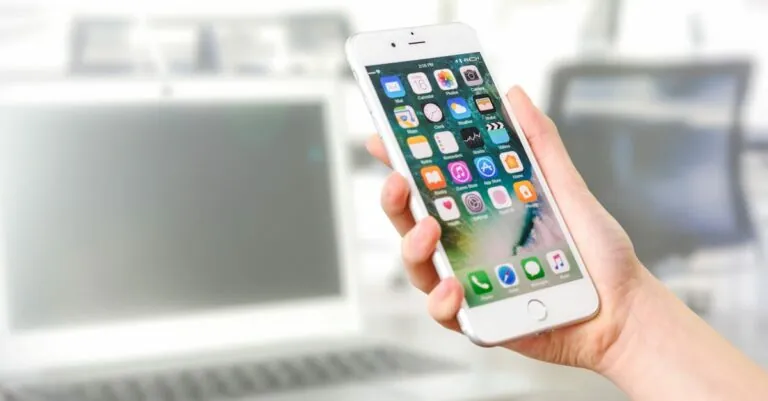In today’s tech-savvy world, our smartphones are like digital Swiss Army knives, packed with personal secrets and vital information. So what happens when that trusty iPhone starts acting like it’s auditioning for a spy movie? If you’ve ever wondered if your device has been hacked, you’re not alone. It’s not just paranoia; it’s a valid concern that can leave anyone feeling like a character in a thriller.
Signs of a hacked iPhone can be sneaky, popping up when you least expect them. From mysterious battery drains to unfamiliar apps, these red flags can make you feel like you’re living in a tech horror story. But don’t panic just yet! By knowing what to look for, you can take control and ensure your iPhone isn’t moonlighting as a hacker’s playground. Let’s dive into the telltale signs that your beloved device may have been compromised.
Table of Contents
ToggleSigns Your iPhone May Have Been Hacked
Awareness of potential signs can help detect a hacked iPhone. Look for these common indicators.
Unusual Behaviors
Strange behaviors often signify a security issue. Rapid battery drain, even when not in use, may indicate unauthorized background activity. Unexpected app crashes or sluggish performance can also suggest interference. Frequent data usage spikes, especially with no clear reason, warrant attention. If the device restarts without prompt, this could signal external control. Receiving unexpected messages or calls from unknown numbers might indicate compromised contact information. Monitoring these irregularities helps identify any hacking attempts.
Unknown Apps Installed
Unexpected apps appearing on the device serve as another red flag. Apps that were not downloaded by the user typically indicate malicious access. Checking for unfamiliar software in the app library is crucial. Assessing permissions for these apps can reveal unauthorized access to personal information. Users should investigate the purpose of unknown apps and uninstall those that seem suspicious. Enabling clearing app cache regularly can assist in removing leftover data. Keeping the app store settings updated helps prevent unwanted installations.
Checking Your iPhone For Malware
Monitoring an iPhone for signs of malware is critical for maintaining security. By adopting specific strategies, users can detect potential threats and take action promptly.
Using Security Software
Utilizing reputable security software significantly enhances protection. Options like Norton Mobile Security and McAfee Mobile Security provide essential tools against malware. Scheduled scans regularly check for corrosive apps, ensuring consistent device safety. Additionally, these programs offer features like anti-theft and data breach alerts, which enhance security further. Overall, combining a trusted security app with built-in iPhone security measures amplifies device safety.
Manual Inspection
Performing manual checks on an iPhone aids in identifying suspicious activity. First, examining installed apps helps locate any unfamiliar or unexpected software. Next, reviewing app permissions reveals insights about data access that may seem excessive. Monitoring battery life and data usage trends also uncovers irregularities. Lastly, assessing recent system updates ensures the device runs the latest security patches. Regular manual inspections complement software security measures for comprehensive protection.
Protecting Your iPhone From Future Hacks
Prioritizing the protection of an iPhone involves implementing key strategies to enhance security. Regular software updates play a vital role. Updates from Apple often address security vulnerabilities, so enabling automatic updates ensures the device stays protected against threats. Users should check for updates frequently if automatic settings are off. Keeping the iOS current not only patches known issues but also improves overall functionality.
Strong password practices serve as another essential line of defense. Creating complex passwords that combine letters, numbers, and symbols is crucial. Passwords should be unique for each account to minimize the risk of one breach compromising multiple accounts. Utilizing two-factor authentication adds an extra layer of security. Review existing passwords regularly, updating them as necessary to maintain security. These methods significantly improve the overall protection of personal information on an iPhone.
What To Do If You Suspect Your iPhone Is Hacked
Taking swift action is crucial if there’s any suspicion of an iPhone hack. Users must assess their devices thoroughly for signs of unauthorized access.
Steps to Take Immediately
Check for unusual activity first. Examine recent calls, messages, and installed applications for anything unfamiliar. Review battery usage, noting apps that drain power rapidly. It’s also wise to disconnect from Wi-Fi and mobile data to prevent further unauthorized access. Change passwords for all important accounts, focusing specifically on email and banking. Enable two-factor authentication where possible. Lastly, back up important data to secure storage, ensuring files are safe should a reset become necessary.
Contacting Apple Support
Reach out to Apple Support without delay. They provide direct assistance for suspected hacking incidents. Users can describe the strange behavior or signs noticed, facilitating a quicker response. Apple may suggest specific diagnostic steps to identify potential vulnerabilities. It’s beneficial to provide as much detailed information as possible. Depending on the situation, they might recommend restoring the iPhone or installing the latest security updates. Taking these actions ensures professional guidance, enhancing device security moving forward.
Staying vigilant about iPhone security is essential in today’s digital landscape. Users should regularly monitor for signs of hacking and take proactive measures to protect their devices. By being aware of unusual behaviors and unfamiliar apps, they can act swiftly to safeguard their personal information.
Implementing strong security practices like updating software and using complex passwords can significantly reduce the risk of unauthorized access. If there’s any suspicion of a hack, taking immediate action—such as changing passwords and contacting Apple Support—can help mitigate potential damage. Prioritizing smartphone security ensures peace of mind and protects valuable data from threats.





